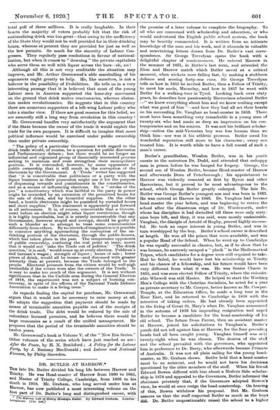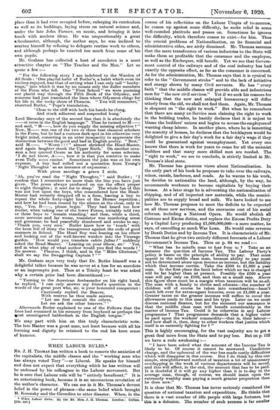DR. BUTLER AT HARROW.*
TUB late Dr. Butler divided his long life between Harrow and Trinity. He was Head-master of Harrow from 1860 to 1885, and Master of Trinity College, Cambridge, from 1886 to his death in 1918. Mr. Graham, who long served under him at Harrow, has now published a most interesting volume on the first part of Dr. Butler's long and distinguished career, with • The Barrow We of Henry Montagu Eatiar. fly Edward Graham. London • 1.21s. net.1
the promise of a later volume to complete the biography. To all who are concerned with scholarship and education, or who would understand the English public school system, the book may be heartily commended. It is written from an intimate knowledge of the man and his work, and it abounds in valuable and entertaining letters drawn from Dr. Butler's vast corre- spondence. Sir George Trevelyan opens the book with a delightful chapter of reminiscences. Ho entered Harrow in the summer of 1851, in Butler's last term, and attended the Eton and Harrow match which Butler saved at a oritical moment, when wickets were falling fast, by making a stubborn defence and scoring forty-one runs. Sir George Trevelyan tolls us how in 1855 he invited Butler, then a Fellow of Trinity, to meet his uncle, Macaulay, and how in 1857 he went with Butler for a walking-tour in Tyrol. Looking back over sixty years, he describes how passionately Harrovians admired Butler —" we knew everything about him and we knew nothing except what was good of him "—and how they had all set their hearts on his succeeding Dr. Vaughan as head-master in 1859. There must have been something very remarkable in a young man of twenty-six who had made so deep an impression on his con- temporaries and on his seniors, it was not his brilliant scholar- ship—unless the mid-Victorian boy was less human than we think him—nor was it his athletic prowess. Butler owed his wonderful reputation still more to his character ; every one trusted him. It is worth while to have a full record of such a man's career.
Butler's grandfather, Weedon Butler, was in his youth curate to the notorious Dr. Dodd, and attended that unhappy man in prison before he was hanged for forgery. George, the second son of Weedon Butler, became Head-master of Harrow and afterwards Dean of Peterborough; his appointment to Harrow was violently resented at first by Byron and other Harrovians, but it proved to be most advantageous to the school, which George Butler greetly enlarged. The late Dr. Butler was George Butler's youngest son and was born in 1833. He was entered at Harrow in 1846. Dr. Vaughan had become head-master the year before, and was beginning to revive the school after the disastrous reign of Dr. Wordsworth, under whose lax discipline it had dwindled till there were only sixty- nine boys left, and they, it was said, were mostly undesirable. Vaughan, the disciple of Arnold of Rugby, proved highly success- ful. He took an eager interest in young Butler, and was in turn worshipped by the boy. Butler's school career is described at length, lie won all the prizes that were available, and was a popular Head of the School. When he went up to Cambridge he was equally successful in classics, but, as if to show that he was human, he narrowly escaped a" pluck" in the Mathematical Tripos, which candidates for a degree were still required to take. Had he failed, he would have lost his scholarship at Trinity and his chance of a fellowship, and his future would have been very different from what it was. He was Senior Classic in 1855, and was soon elected Fellow of Trinity, where the redoubt- able Whewell was still blaster. He helped to start the Working Men's College with the Christian Socialists, he acted for a year as private secretary to Mr. Cowper, better known as Mr. Cowper- Temple, at the Education Office, he made a long tour in the Near East, and he returned to Cambridge in 1858 with the intention of taking orders. He had already been appointed to the living of Great St. Mary's when Dr. Vaughan announced in the autumn of 1859 his impending resignation and urged Butler to become a candidate for the head-mastership of his old school. The future Dean Farrar, then an assistant master at Harrow, joined his solicitations to Vaughan's. Butler't youth did not tell against him at Harrow, for the four procedine heads had all been caught young. Vaughan himself was oily twenty-eight when he was chosen. The desires of the staff and the school prevailed with the governors, who appointed him in preference to Dr. Barry, who afterwards became Primate of Australia. It was not all plain sailing for the young head- master, as Mr. Graham shows. Butler held that a head-master must be an autocrat, and he would not have his decisions questioned by the older members of the staff. When his friend Edward Bowen differed with him about a Modern Side scholar- ship in 1878 and appealed to the Governors, Butler informed the chairman privately that, if the Governors adopted Bowen's view, he would at once resign the head-mastership. On hearing of this, Bowen withdrew his proposal. But Mr. Graham assures us that the staff respected Butler as much as the boys did. Dr. Butler unquestionably raised the school to & higher
place than it had ever occupied before, enlarging its curriculum as well as its buildings, laying stress on natural science and, under the late John Farmer, on music, and bringing it into touch with modern ideas. He was unquestionably a great azhoolmaster, although, the author says, ho was inclined to overtax himself by refusing to delegate routine work to others, and although perhaps he exacted too much from some of his own pupils.
Mr. Graham has collected a host of anecdotes in a most attractive chapter on "The Teacher and the Man." Let us quote a few :—
"For the following story I am indebted to the Warden of AU Souls : 'One playful habit of Butler's, a habit which even its victims enjoyed, was that of setting what I can only call "booby- traps," into which it was by no means only the duller members of the Form who fell. One "First School" we were pursuing our placid way through the Fifth Book of the Odyssey, and someone had just translated the lines where Odysseus clings for his life to the rocky shore of Phteacia. "You will remember," observed Butler, "Pope's translation,
'Close to the cliff with both his hands he clung,
And stuck adherent and suspended hung.'
Lord Macaulay says of the second line that it is absolutely the —at verse in the English language." Then he turned to M- end said, El—, how do you supply the missing adjective ? " Now, M— was one of the two or three best classical scholars in the Form, but he had a curious dark spot in his otherwise very bright mind, consisting in an utter incapacity to appreciate the distinction between the good and bad in English poetry. "Best," said hi—. "Worst I I " almost shrieked the Head-Master, and again laughter shook the Upper Sixth.' On another occa- sion a boy quoted Cicero as his authority for some solecism. '1 do not know, A—, how it is that you contrive to make even Tully seem canine.' Sometimes the joke was at his own expense. A boy had rolled out a quotation from Young's 'Night Thoughts' as an instance of oxymoron With pious sacrilege a grave I stole.
Ah, you've read the "Night Thoughts,"' said Butler I confess that I remember no more than the lino you have just given. The poem always produced on me the effect proper to night thoughts ; it sent me to sleep.' The whole fun of this was not lost upon the boys, who remembered how the Head- Master had recently dropped off in a doze, leaving a boy to repeat the whole forty-eight lines of the Horace repetition and how he had been roused by the silence at the close, only to Ray, 'Yes, B—, please begin.' They had hoard too how butler, when taking one of the lower Forms, irritably told two or three boys to 'remain standing,' and then, while a third, more nervous and far worse, translator was murdering sense and grammar, he had peacefully slumbered and awoke to say, 'Thank you, very nice.' Butler knew how to ' touch ' with the keen foil of irony the transgressor against the code of good manners in School. The Head Boy was leaning on his elbow and looking out of the well-known window into the Vicarage garden. 'How would you translate cubito fedi= ? suddenly asked the Head-Master. 'Leaning on your elbow, sir.' 'Yes, and in what play of what author would you find the words 7' No answer. 'Plautus, I think, and in the "Miles Gloriosus," shall we say the Swaggering Captain ? ' " Mr. Graham says very truly that Dr. Butler himself was a delightful talker because he was never at a loss for an anecdote or an impromptu jest. Thus at a Trinity feast he was asked why a certain prize had been discontinued :— " Turning to the American Ambassador on his right hand, he replied, 'I can only answer my friend's question in the words of the great poet who, sir, is your honoured compatriot : Cautiously replied the Beaver,
With reserve he thus made answer, "Let me first consult the others.
Let me ask the other beavers."' Afterwards Butler explained to one of the Fellows that the lines had remained in his memory from boyhood as perhaps the 'goat unmitigated balderdash in the English tongue."
We may part with him on this truly characteristic note. The late Master was a great man, not least because with all his learning and dignity he retained to the end his keen sense of humour.







































 Previous page
Previous page